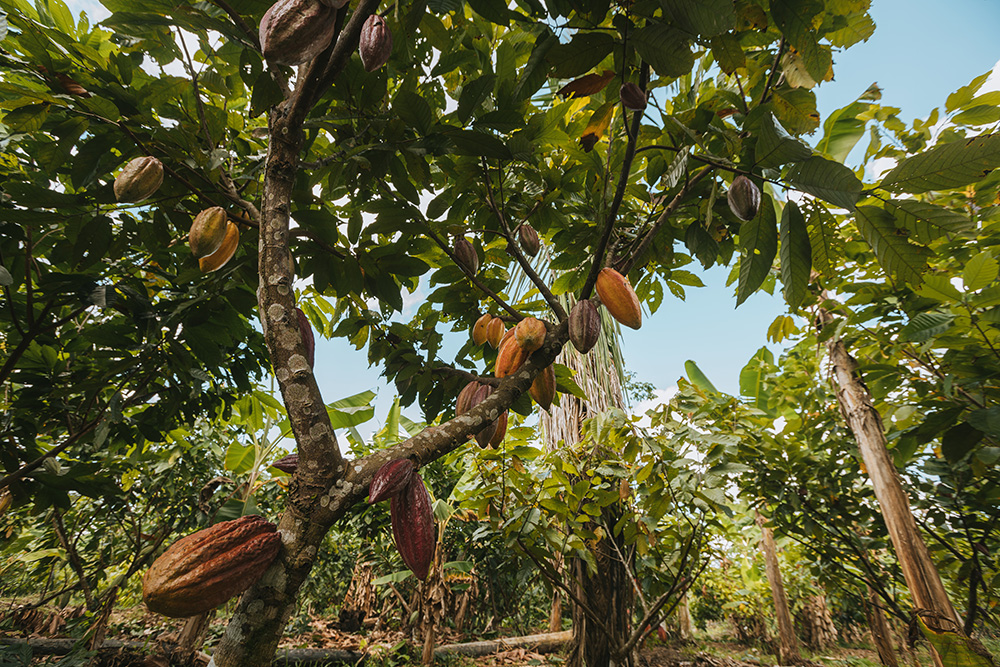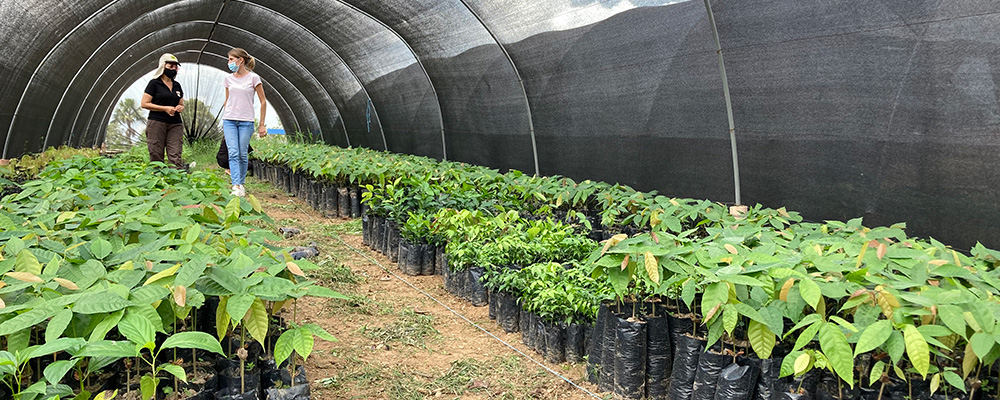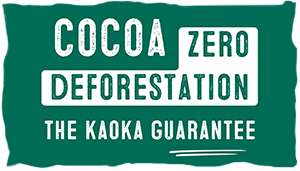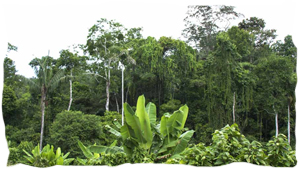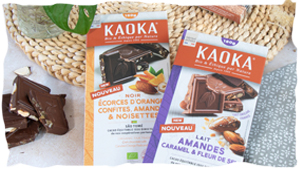8.97 million euros towards a sustainable gourmet and zero-deforestation cocoa
After 3 years of work, we are proud to be the initiators and co-signatories of a public-private partnership for the conservation and regeneration of ecosystems, protection of biodiversity, and promotion of agroecology in the cocoa industry in Peru, Colombia and Ecuador.
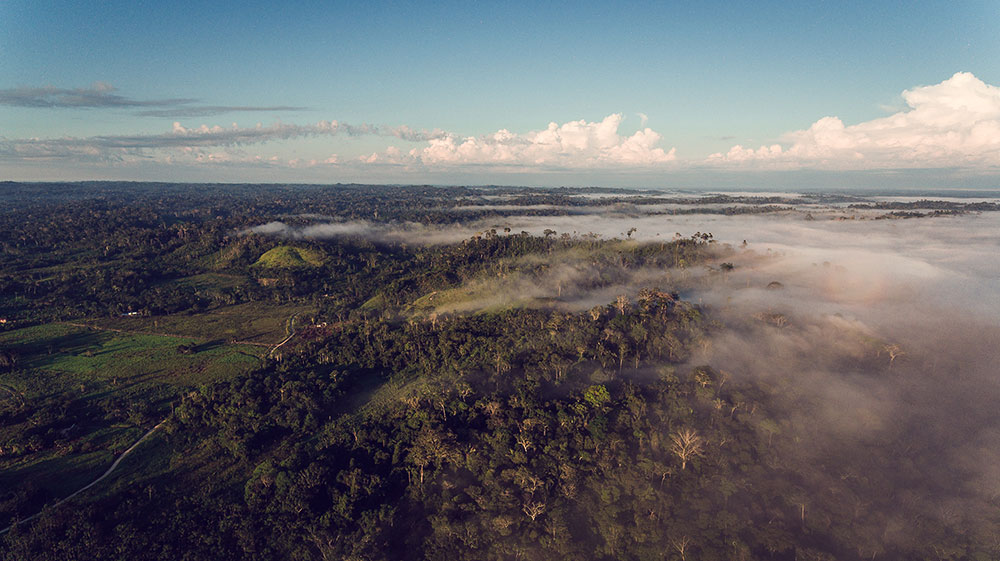
“As a matter of fact, for 30 years, we have been working in Latin America to establish partnerships with local cocoa producers. Together, we share the same ambition: to produce excellent cocoa using sustainable techniques, in a spirit of fairness, while preserving ecosystems.
But today, the facts are clear: the destruction of primary forests is accelerating and the consequences of this phenomenon on biodiversity are extremely serious. While some actors are content with a pledge to replant trees, we do not subscribe to this «tree-washing» approach, and we believe that it is urgent to preserve and restore these primary forests and their ecosystems.
Faced with the magnitude of the challenge and its ecological, economic, and social complexity, it was essential for a small family business like ours to join forces with international expert partners. For this reason, this summer we signed a unique partnership with the Alliance of Bioversity International and the International Center for Tropical Agriculture (CIAT), World Agroforestry (ICRAF) and the NGO Conservation International. In this collaboration, each partner, a recognized specialist in its field, will contribute its specific skills and expertise.
An exemplary approach to public-private cooperation, our project is set to be a laboratory for experimenting with the revolution that we must lead. We aim to prove its effectiveness and ability to be scaled out to help protect unique forest ecosystems and carbon reservoirs that are essential to decelerating climate change.
Co-funded by Kaoka and FFEM (French Facility for Global Environment), this €8.97 million project is fully consistent with the National Strategy to Combat Imported Deforestation (SNDI), which aims to put an end to the import of forest or agricultural products, including cocoa, that contribute to deforestation. It is, therefore, for the survival of the sector and the future of our producer partners that we renew our commitment today.”
Guy Deberdt, Director General of KAOKA and Sébastien Balmisse, Director, Sectors and Quality – RSE Director at Kaoka
Towards a sustainable gourmet and zero-deforestation cocoa
For Kaoka, a familyowned French business specialized in organic fair-trade chocolate, sustainable excellence and environmental protection are not words to be used lightly. In fact, they should be much more than a mere thought. Since its establishment 30 years ago, Kaoka’s commitment to sustainability and environmental protection has been at the forefront of all of its activities. Kaoka is now adding value to its original approach by initiating an ambitious ecosystem preservation and regeneration project and promoting agroecological systems in the cocoa industry in Peru, Colombia and Ecuador.
To this end, Kaoka is collaborating with the Alliance of Bioversity International and the International Center for Tropical Agriculture (CIAT), and World Agroforestry (ICRAF), two CGIAR research centers, as well as with an international NGO specializing in the preservation of natural resources (Conservation International) and local cocoa farmers’ associations.Launched in July 2021, the project is co-financed by the French Facility for Global Environment (FFEM), Kaoka, and the project partners. Together, they will contribute to creating a sustainable cocoa value chain and, most of all, one that is fully tailored to the specific challenges linked to fighting deforestation, restoring soil, preserving biodiversity, and developing the economy in these countries.
The project seeks to promote a “cocoa of excellence” for Colombia, Ecuador, and Peru, three neighboring countries for which cocoa is a symbol of their shared history and riches in terms of both culture and biodiversity.
*CIAT will intervene on behalf of Alliance Bioversity International- CIAT.
The objectives of this €8.97m project
- Develop agroforestry techniques
- Restore ecological connectivity to allow wildlife’s free movement in their natural habitat
- Ensure landscape conservation
- Strengthen infrastructure and farmers’ capacity
The project is supported by the Ministry of Ecological Transition
Launch in July 2021, the project will last 4 years..
Project partners and their roles
Project coordination and technical support

Kaoka, french company, aromatic and organic fair-trade cocoa specialist
Expertise: mastery of the cocoa industry and cocoa’s organoleptic profiles.
Its role within the project: provide expertise in a range of fields related to cocoa production, transformation, and commercialization. Kaoka will co-finance the project and will be considered as a technical partner for the coordination, monitoring, and implementation of activities.
Kaoka will co-chair the steering committee with the Alliance of Bioversity International and CIAT.

Alliance of Bioversity International and CIAT, biodiversity, climate change, environment and nutrition research specialists
Expertise: deliver research-based solutions that address the global crises of malnutrition, climate change, biodiversity loss, and environmental degradation. With novel partnerships, the Alliance
generates evidence and mainstreams innovations to transform food systems and landscapes so that they sustain the planet, drive prosperity, and nourish people in a climate crisis.
Its role within the project: carry out mapping activities, identify native varieties, select crop-specific equipment for the implementation of grafts and nurseries, and codesign conservation plans. CIAT will sign an agreement with FFEM and will be in charge of project coordination and the distribution of funding allocations to local partners.

World Agroforestry (ICRAF), agroforestry research specialists
Expertise: develop research and provide scientific evidence on the benefits of trees for people and the environment.
Its role within the project: to assess indigenous communities’ knowledge on agroforestry systems to increase their knowledge base through tailored approaches.
Implementation
Kaoka Foundation (Ecuador)
Expertise: renew cocoa plantations under the agroforestry system, manage deforestation monitoring systems, and sign individual and/or collective conservation agreements with local farmers.
Kaoka Foundation is a local NGO that receives funding from FFEM and co-finances projects through cocoa fair-trade premiums paid by Kaoka.
Note: even though both entities share the same name, Kaoka Foundation is independent from Kaoka.
Biococoa (Peru)
Restore degraded soil and promote planting of aromatic cocoa under agroforestry systems, sign individual and/or collective conservation agreements with local farmers, and manage deforestation
monitoring systems.
Biococoa is a local NGO that receives funding from FFEM and co-finances projects through cocoa fair-trade premiums paid by Kaoka.

Conservation International (Colombia)
Implement environmental preservation programs and restore natural resources, promote planting of cocoa under agroforestry systems, sign individual and/or collective conservation agreements with local farmers, manage deforestation monitoring systems, and promote commercial agreements with sales representatives from the cocoa of excellence sector.
Cocoa farmers involved in the project
Colpa de Loros cooperative in Peru
Partner cooperatives in Ecuador
Partner cooperatives in Ecuador
The project will aim to establish new profitable commercial opportunities.
Funding partners

FFEM (French Facility for Global Environment)
Expertise: preservation of the environment and sustainable social and economic development in developing and emerging countries.
Its role within the project: contribute with funding to the project through grants allocated to CIAT, which will be eventually disbursed to the implementing partners.
Fostering sustainable cocoa farming methods to preserve unique biodiversity
Since the 1990s in Latin America, the expansion of arable land has led to the destruction of the Amazon rainforest. This deforestation is a crucial and complex climate change and biodiversity concern. It has led to soil depletion, destruction of biodiversity, and an unprecedented decline in farmers’ revenue. The cocoa tree agroecology regeneration project spearheaded by Kaoka aims to bring value back to cocoa farming: a cocoa of excellence that is economically viable and sustainably produced without deforestation.
The situation is alarming in Colombia, Ecuador, and Peru. Since the 1990s, the rapid expansion of agricultural lands is one of the main drivers of destruction of local forest ecosystems. Intensive
production methods, in particular those of coca, drove farmers to deforest new areas for production. This phenomenon is called «the pioneer front» and has largely accelerated deforestation. The
conversion of forest areas into crop lands has also led to the fragmentation of wildlife’s natural habitats and degradation of biodiversity and ecosystems. The productivity of depleted lands has decreased, thus making difficult to produce staple crops and ensure sufficient income for the local populations.
Kaoka’s project to regenerate cocoa plantations using an agroecological approach provides concrete and expert solutions to these challenges.
ZOOM IN… ON ECOLOGICAL CONNECTIVITY
Ecological connectivity seeks to bridge together all the different natural areas in order to allow animals and plants to move freely, all the while restoring ecological continuity. Indeed, the loss of natural habitats and their fragmentation is a major driver of biodiversity erosion.
Concrete solutions to preserve unique biodiversity
Develop Agroforestry
Turning to agroforestry techniques in cocoa farming not only diminishes the need for farming inputs but also allows farmers to combine food crops (fruit trees, plantains, pepper plants, etc.) and forest tree species with cocoa trees. This creates a virtuous circle that guarantees immediate and long-term revenue for farmers, all the while restoring soil fertility. This approach guarantees the sustainability of cocoa farming, while limiting the expansion of agricultural land into forests. The agroforestry systems proposed within the framework of this project will be tailor-made for local ecosystems as well as for farmers’ needs and goals.
Reestablish ecological connectivity
In response to the destruction of forests, the different species that inhabit them are modifying their natural habitat. This is a particularly concerning issue for the Amazon portion of the project, both in Peru and in Colombia, a place with a great wealth of biodiversity, and its preservation is essential. By replanting hedges, shade trees, etc., the project offers a way for the different species to move from one forest area to another and rebuild their natural living environment. Restoring ecological connectivity therefore helps to preserve biodiversity endangered by previous deforestation practices.
Strengthen productive infrastructure and farmers’ capacity
This project seeks to improve the entire cocoa supply chain, from its cultivation and to its final commercialization. The technical support farmers will receive will allow them to expand and enhance their facilities for fermentation and drying of cocoa beans.
With the support of Kaoka, research work will be carried out to better control the fermentation process. Farmers will also benefit from training aimed at strengthening their skills for implementing sustainable agricultural practices.
Ensure landscape conservation
Primary forests contain massive quantities of carbon dioxide and their destruction triggers significant greenhouse gas emissions, thus accelerating climate change.
As a part of this project, tools for impact assessment and monitoring of agricultural production areas will be developed. Through conservation agreements, farmers and farmer organizations will commit to protecting and promoting and valuing their regions’ forests and limiting the expansion of their farming operations.
Restoring old plantations using agroforestry increases on-farm profitability by diversifying the crops and improving land productivity.
Furthermore, the project will contribute to restoring areas with severely degraded soils (old grazing areas) and putting these areas back into productive use.
These two combined effects will ensure that cocoa farming does not lead to deforestation.
Differentiated strategies
In the Andean region, cocoa is a crop of economic and social importance. Cocoa is mainly produced by small to medium family farms, comprising hundreds of thousands of farmers. Production volumes have risen significantly in response to the ever-growing demand on national and international markets. However, environmental, social, and economic concerns are not the same in Colombia, Ecuador, and Peru. Therefore, this project implemented by Kaoka takes into account site-specific challenges.
Colpa de Loros Cooperative in Peru
Site-specific challenges:
- Replace coca production
- Preserve forest areas and fragile ecosystems in the region
- Identify cocoa landraces with the aim to reestablish and leverage their production
The project’s objectives:
- Restore 200 hectares of degraded soil
- Establish aromatic cocoa varieties using agroforestry systems on restored soil
- Sign collective and individual conservation agreements
- Promote quality to produce organic and fair-trade gourmet cocoa
- Adopt deforestation monitoring systems
Partner cooperatives in Ecuador
Site-specific challenges:
- No pioneer fronts, but a desire for forest preservation
- Re-establish ecological connectivity
- Renovate or replace aging cocoa trees
The project’s objectives:
- Renovate 300 hectares of domestic cocoa fields using the agroforestry system
- Sign collective and individual conservation agreements
- Implement a research and development program on cocoa fermentation management
- Promote quality to produce organic and fair-trade gourmet cocoa
- Adopt deforestation monitoring systems
Conservation international in Colombia
Site-specific challenges:
- Develop more aromatic cocoa varieties
- Promote exports to increase farmers’ income
The project’s objectives:
- Plant 100 hectares to cocoa under the agroforestry system
- Sign collective and individual conservation agreements
- Support the structuring of a cocoa of excellence chain
- Promote commercial agreements for the cocoa of excellence sector
- Foster production of large volumes of organic and fair-trade cocoa of excellence
- Enable adoption of deforestation monitoring systems
HOW DOES AGROFORESTRY WORK?
Cocoa trees grow naturally under shade trees. For this reason, agroforestry incorporates fruit trees and forest trees in cocoa plantations. This ancestral system fosters greater biological diversity and the formation a substrate suitable for increased crop performance. This shading system provides a microclimate, mitigates droughts and reduces disease outbreaks.
By intensifying production in the same cultivated areas, and by restoring degraded soils (damaged by grazing, for example), the forest is no longer negatively affected by the expansion of crop areas. In the context of climate change, agroforestry contributes to limiting GHG emissions and restoring soil to ensure the plantation sustainability. Agroforestry guarantees increased crop yield and diversified income sources for farmers.
We will continue to keep you informed of progress and actions throughout the project!
